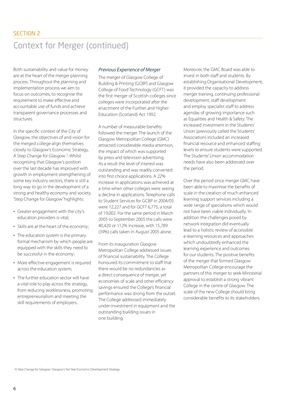
6
SECTION 2
Context for Merger (continued)
Both sustainability and value for money
are at the heart of the merger planning
process. Throughout the planning and
implementation process we aim to
focus on outcomes, to recognise the
requirement to make ef ective and
accountable use of funds and achieve
transparent governance processes and
structures.
In the specii c context of the City of
Glasgow, the objectives of and vision for
the merged college align themselves
closely to Glasgow's Economic Strategy,
A Step Change for Glasgow 2. Whilst
recognising that Glasgow's position
over the last decade has improved with
growth in employment strengthening of
some key industry sectors, there is still a
long way to go in the development of a
strong and healthy economy and society.
'Step Change for Glasgow' highlights:
Greater engagement with the city's
education providers is vital;
Skills are at the heart of the economy;
The education system is the primary
formal mechanism by which people are
equipped with the skills they need to
be successful in the economy;
More ef ective engagement is required
across the education system;
The further education sector will have
a vital role to play across the strategy,
from reducing worklessness, promoting
entrepreneurialism and meeting the
skill requirements of employers.
•
•
•
•
•
Previous Experience of Merger
The merger of Glasgow College of
Building & Printing (GCBP) and Glasgow
College of Food Technology (GCFT) was
the i rst merger of Scottish colleges since
colleges were incorporated after the
enactment of the Further and Higher
Education (Scotland) Act 1992.
A number of measurable benei ts
followed the merger. The launch of the
Glasgow Metropolitan College (GMC)
attracted considerable media attention,
the impact of which was supported
by press and television advertising.
As a result the level of interest was
outstanding and was readily converted
into i rst choice applications. A 22%
increase in applications was achieved at
a time when other colleges were seeing
a decline in applications. Telephone calls
to Student Services for GCBP in 2004/05
were 12,227 and for GCFT 6,775, a total
of 19,002. For the same period in March
2005 to September 2005 the calls were
40,420 or 112% increase, with 15,789
(39%) calls taken in August 2005 alone.
From its inauguration Glasgow
Metropolitan College addressed issues
of i nancial sustainability. The College
honoured its commitment to staf that
there would be no redundancies as
a direct consequence of merger, yet
economies of scale and other ei ciency
savings ensured the College's i nancial
performance was strong from the outset.
The College addressed immediately
under-investment in equipment and the
outstanding building issues in
one building.
Moreover, the GMC Board was able to
invest in both staf and students. By
establishing Organisational Development,
it provided the capacity to address
merger training, continuing professional
development, staf development
and employ specialist staf to address
agendas of growing importance such
as Equalities and Health & Safety. The
increased investment in the Students'
Union (previously called the Students'
Association) included an increased
i nancial resource and enhanced stai ng
levels to ensure students were supported.
The Students' Union accommodation
needs have also been addressed over
the period.
Over the period since merger GMC have
been able to maximise the benei ts of
scale in the creation of much enhanced
learning support services including a
wide range of specialisms which would
not have been viable individually. In
addition the challenges posed by
network integration did eventually
lead to a holistic review of accessible
e-learning resources and approaches
which undoubtedly enhanced the
learning experience and outcomes
for our students. The positive benei ts
of the merger that formed Glasgow
Metropolitan College encourage the
partners of this merger to seek Ministerial
approval to establish a strong vibrant
College in the centre of Glasgow. The
scale of the new College should bring
considerable benei ts to its stakeholders.
2A Step Change for Glasgow: Glasgow's Ten Year Economic Development Strategy